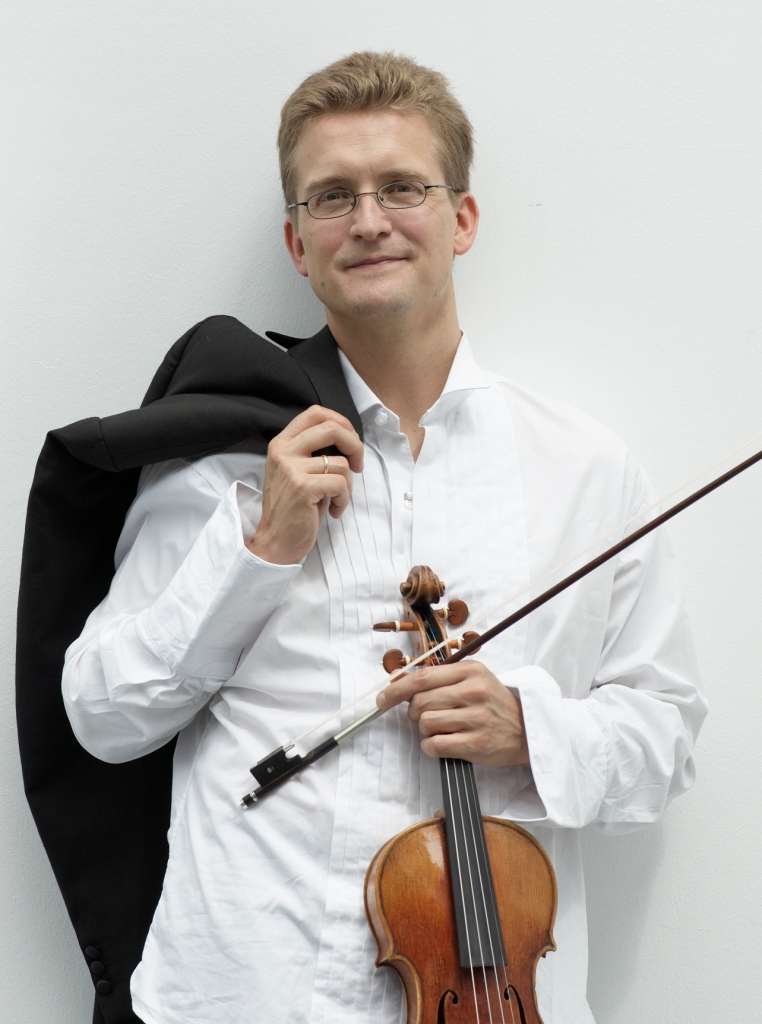|
Back
We're Mighty Glad We Came Miami
New World Center
04/27/2013 - & April 28*, 2013
Johannes Brahms: Violin Concerto in D major, Opus 77
Gustav Mahler: Symphony No. 4 in G major
Christian Tetzlaff (violin), Kiera Duffy (soprano)
New World Symphony, Michael Tilson Thomas (conductor)

C. Tetzlaff (Courtesy of NWS)
There is a reason Mahler's Fourth Symphony is probably his most popular. The beauty and tenderness are inescapable and for many, never greater for this composer. Those intimidated by his excessive angst need not worry this time. It is not unreasonable to consider this symphony Mahler's Pastoral, but it is more the serenity of human beings than of nature in general. For newcomers to Mahler the fourth really is an ideal beginning. Such peace and innocence with the sleigh bells in the first movement might cause one to reflect on the effects that sound and color on an infant. Where does one begin praising the orchestra. All sections have moments to show their stuff, but with New World there is never the sense of upstaging. Mr. Tilson Thomas has created an ensemble that simply respects the music and appears to be thriving on the challenge presented. The second movement Scherzo, though being inspired by a somewhat ominous German folk character, is never really scary, just adorably impish. The third is probably the most taxing on the orchestra because this is where it is time to get serious. The first two movements have made us prepared for something more engrossing. New World Symphony interprets with such intense subtlety that this movement, the longest, feels much shorter To truly appreciate Mahler the audience must realize that it isn't enough to simply listen; the composer has forced us to become committed partners. Oboist, Kevin Pearl, is the star here; Mahler gave him the responsibility of suppling this work much of its character and Pearl's artistry was deeply felt. The final movement is best remembered by the charm and innocence of the soprano. Here we had the gifted Kiera Duffy who never pushed, allowing even those of who do not speak German, to feel the exuberance of a happy child. This is not an emotion one often finds in classical music; Duffy's honesty made the ending quietly exhilarating. One was likely to smile.
The most unusual thing about this concert was that it really had two finales. If any program starts with a Mahler symphony, it probably feels lopsided, we wouldn't be warmed up. But the Brahms Violin Concerto with its thrillingly cheerful last movement seems to signal that it is time to gather our things and leave feeling uplifted. But being Mr. Tilson Thomas' last time on the podium for this season, he wasn't leaving until we were well fed. Who's complaining? So we got an absolute brilliant violinist, Christian Tetzlaff, playing this piece which seems to toy with being overly sentimental. That's right, “toys with,” because it never gives in. Much of this is to the credit of both Tilson Thomas and especially to the soloist who approaches Brahms with a seriousness that prevents a mushy performance. There may have been times that the orchestra and Tetzlaff were not perfectly in sync but this is what makes attending a performance so much more vital than simply listening to a recording. When chances are taken, they are noticed. It is interesting to observe that after the concerto had given way to audience hysteria, Tetzlaff gave an encore playing the Andante from J. S. Bach's Violin Sonata No. 2 in A minor. No music could have been more sobering following such intense passion, and Tetzlaff's command was every bit as authoritative, using his gentlemanly restraint to divert further audience adulation. Such sincerity made certain this event was about the music.
So the feast is over and hopefully hibernating until Mr. Tilson Thomas and New World return will not be too difficult; though he can be assured that once he comes back, we will be ravenous.
Jeff Haller
|